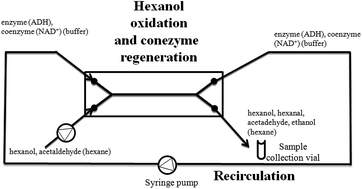ADH-catalysed hexanol oxidation with fully integrated NADH regeneration performed in microreactors connected in series
Abstract
Hexanal is produced by the oxidation of hexanol using NADH dependent alcohol dehydrogenase (ADH). Coenzyme, NADH regeneration is needed in order to make the ADH-catalysed process more sustainable. In this investigation, the coenzyme regeneration was catalysed by the same enzyme, ADH, which catalysed the main reaction, i.e., the oxidation of hexanol. Different sources of ADH were studied (suspended and immobilized enzyme ADH and permeabilized baker's yeast cells) to find the optimal catalyst. The best results were obtained by using suspended enzyme, where 100% conversion of the coenzyme was achieved with a very short residence time (τ = 0.8 s). The final phase of investigation was development of an integrated system with two microreactor chips connected in series. The first chip was used for hexanol oxidation and the second for the simultaneous coenzyme regeneration. Regenerated coenzyme was reused by recirculation in to the first chip, where the oxidation step was continuously performed for three days without the need for the addition of fresh coenzyme.


 Please wait while we load your content...
Please wait while we load your content...